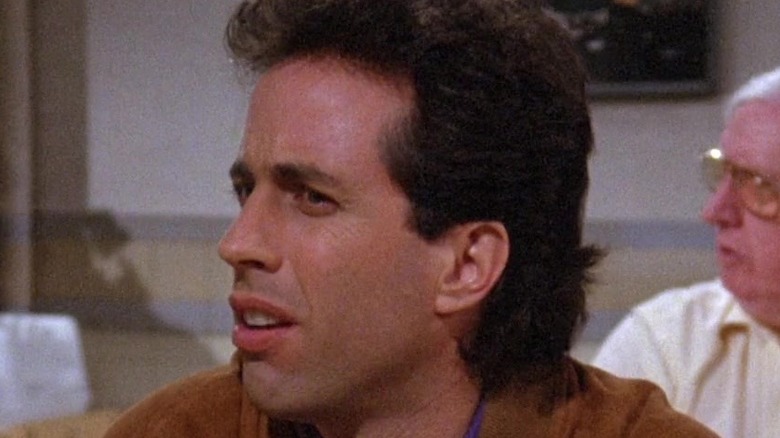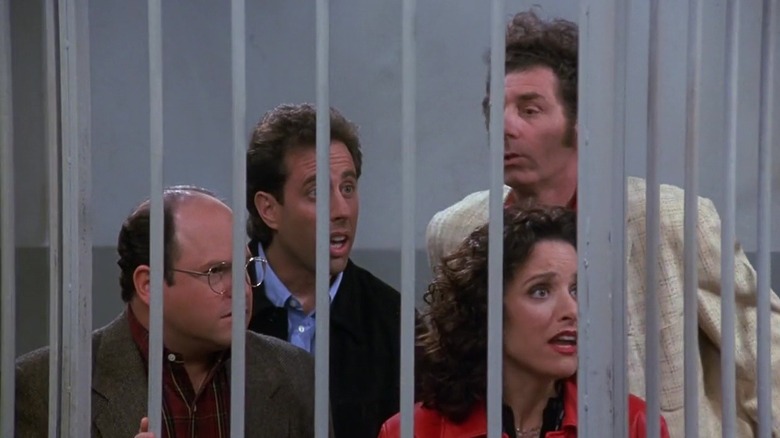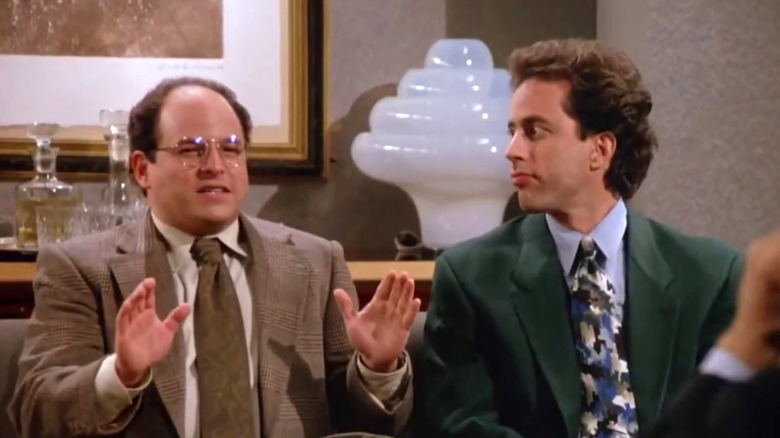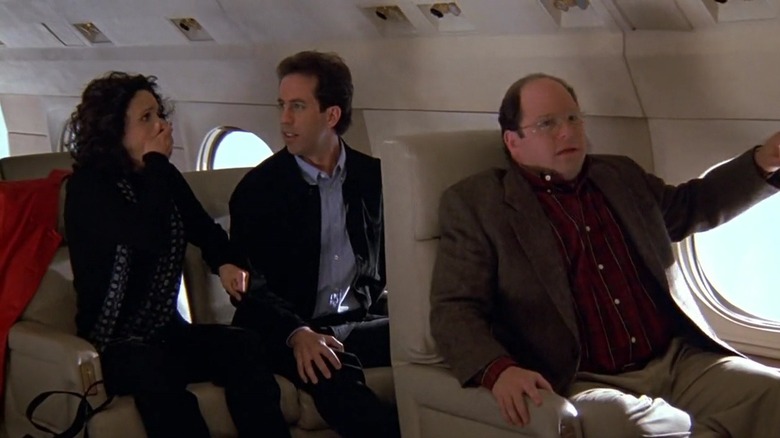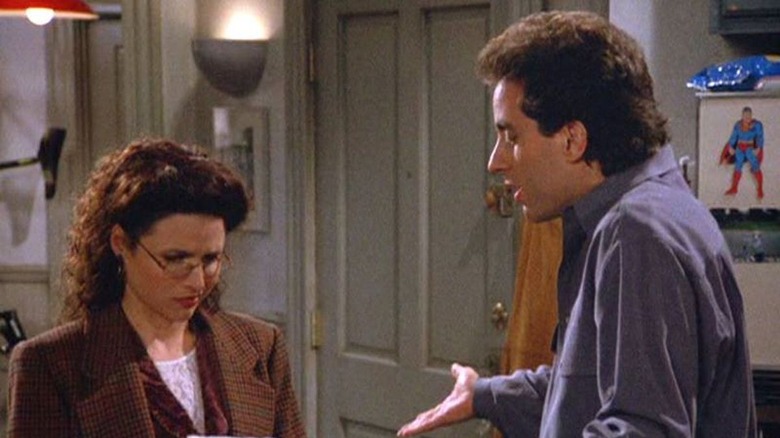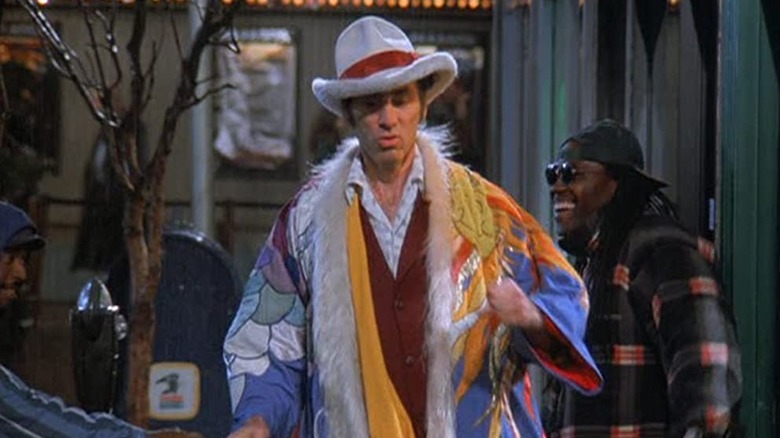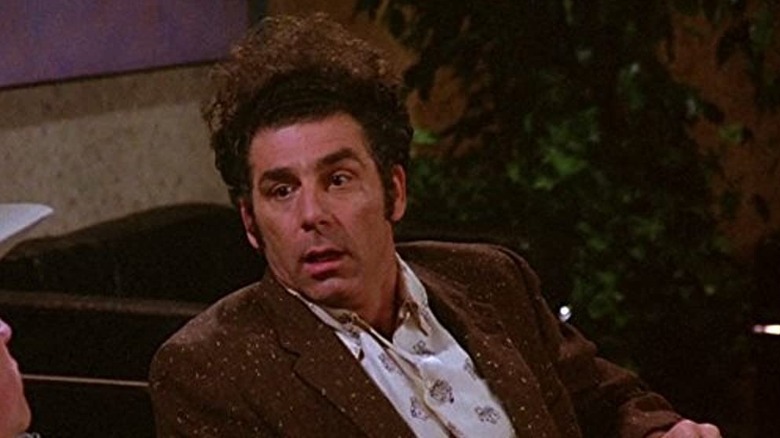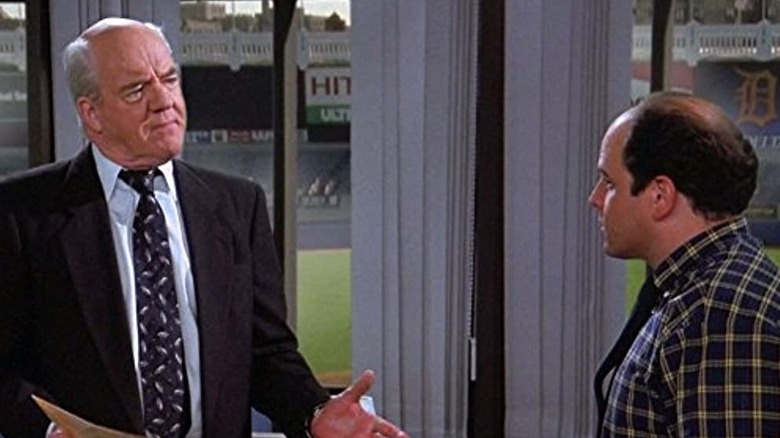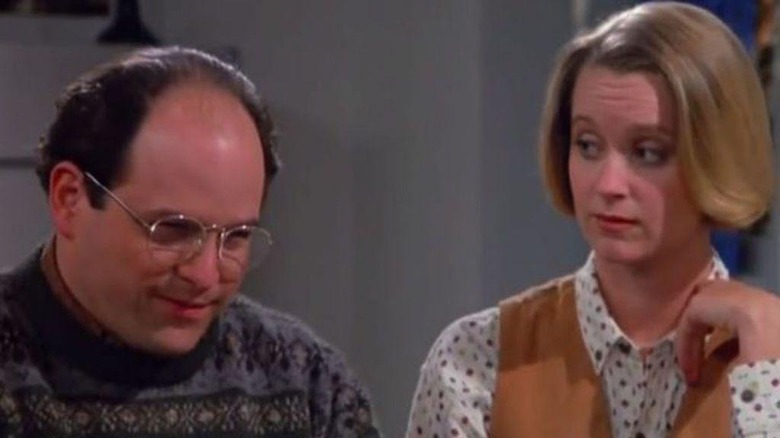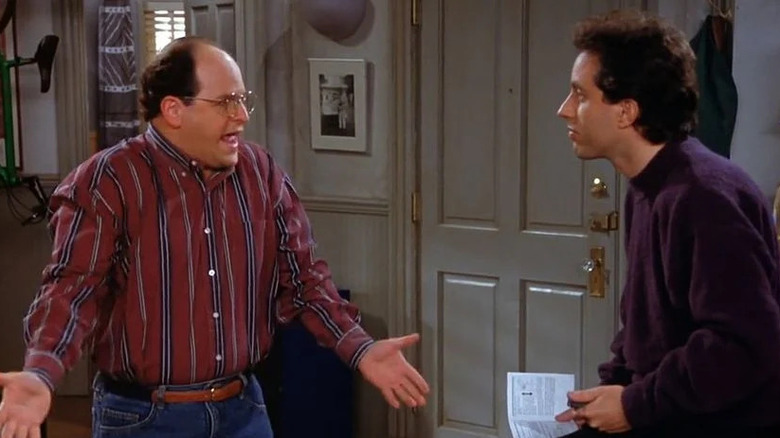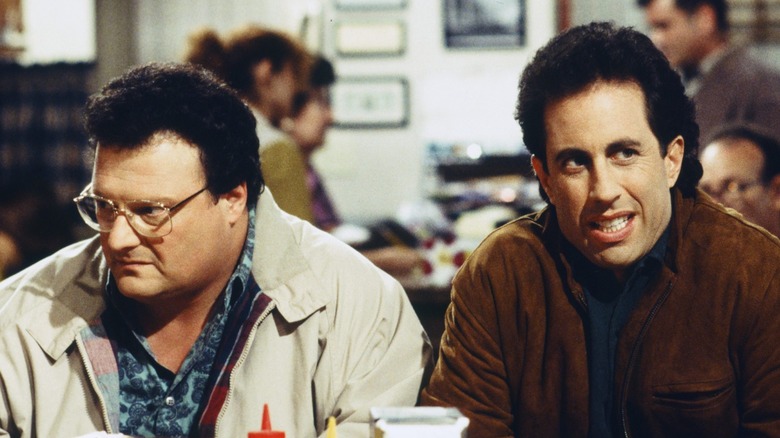Biggest Unanswered Questions From Seinfeld
One of the most enduringly successful television comedies of all time is "Seinfeld," which ran on NBC for nine seasons from 1989 to 1998. Created by Larry David and Jerry Seinfeld, the show followed a fictionalized version of Jerry's life as a stand-up comedian in Manhattan, along with his friends George Costanza, Elaine Benes, and Cosmo Kramer. From facing dictatorial soup chefs to various romantic mishaps, the four characters' misadventures thrilled audiences, though the series ended abruptly, with its main protagonists essentially jailed for being self-centered jerks. A reunion special of sorts appeared in Season 7 of David's HBO comedy series "Curb Your Enthusiasm," revisiting the world of "Seinfeld" a little over a decade after the finale. Still, many questions about the show and its characters remain unanswered.
Here are all the biggest unresolved questions about "Seinfeld," from the fates of its main characters to lingering mysteries from the series' run.
What do the quartet do in prison?
The biggest question surrounding the "Seinfeld" series finale is how the four friends manage to serve their prison sentence. After witnessing a robbery but failing to intervene (and even mocking the victim), the quartet is arrested under a local Good Samaritan law. A public trial ensues, during which seemingly every person the group ever offended over the series' run testifies against them. Each is sentenced to a full year behind bars. While awaiting their prison transport, the foursome goes about their banal conversations as normal, with the only difference being that they are incarcerated. The denouement for the finale shows Jerry continuing his career as a stand-up comedian to entertain his fellow inmates, making humorous observations about prison life, but we otherwise know very little about their time behind bars.
Judging by the "Curb Your Enthusiasm" reunion special, all four characters successfully serve out their prison sentences and return to their normal lives back on the Upper West Side, with Jerry retaining his apartment and cereal collection. It's unclear if the prison sentence and notoriety garnered from the court case have impacted each of their respective lives and careers since their release.
What happens to Jerry and George's show?
One of the overarching plot threads across "Seinfeld" has Jerry and George develop a sitcom together starring Jerry in a facsimile of their lives. George is adamant that the show, which is simply titled "Jerry," be about nothing. An NBC executive in Season 4 agrees to move forward with a pilot order. While the show is canceled shortly after its pilot episode airs due to a change in network leadership, the series is picked up again in the series finale after another executive takes over the network.
However, with Jerry and George both convicted of violating the Good Samaritan law and sentenced to a year of jail time shortly after the pickup order, the show's final fate is unknown. The incarceration of the show's creators and star is sure to impact its production if NBC decides to proceed at all. With the four main characters' court case becoming something of a national broadcast sensation, the notoriety Jerry and George have garnered may have led NBC to quietly shelve "Jerry" for good.
What was Elaine going to tell Jerry in the finale?
The "Seinfeld" series finale has the four longtime friends endure a harrowing experience together on a private flight to Paris after Kramer accidentally stumbles into the cockpit and hits the controls. With the plane plummeting towards the ground and death appearing imminent, Elaine prepares to tell Jerry something in what she presumes is their final moment together before the crash. However, before Elaine can finish her confession, the pilots manage to regain control of the plane and safely land outside of a small town in Massachusetts for repairs.
When the matter is revisited after Jerry and his friends are safely back on terra firma, Elaine dismisses whatever she was about to tell her longtime friend. Given the on/off nature of Jerry and Elaine's flirtatious relationship, Elaine may have been about to confess her true feelings for Jerry, thinking they were both about to die. However, as revealed in the "Curb Your Enthusiasm" reunion, while Elaine and Jerry remain close, they are decidedly keeping their dynamic platonic for the foreseeable future.
What happens with Jerry and Elaine's daughter?
George isn't the only returning character in the "Curb Your Enthusiasm" reunion revealed to be going through domestic woes years after the events of the series finale. It is revealed that sometime after being released from prison, Jerry donated his sperm to Elaine so that she could conceive a child. Raising her daughter Isabelle as a single mother, Elaine led her child to believe that Jerry was a surrogate uncle rather than her biological father to avoid complications. By the end of the reunion episode, Isabelle learns the truth about her parentage and refers to Jerry as her father.
Jerry and Elaine are visibly uncomfortable about Isabelle learning the truth, putting them both in an awkward position about how they should proceed with her upbringing. The two longtime friends kept Jerry's role a secret to avoid giving him the responsibility of being a father and to allow Elaine to raise Isabelle as she saw fit. With Isabelle now in on the secret, this distinction may no longer be an option, forcing Jerry to become involved moving forward.
How does Kramer earn money?
While each of the group's professional lives are explored, including the variety of jobs held by Elaine and George, Kramer's employment status and source of income are an open mystery. Throughout the series, Kramer is seen briefly holding a string of odd jobs and launching get-rich schemes with varying degrees of success. This does still not fully account for Kramer always having enough money to live comfortably in a decently sized apartment in Manhattan's expensive Upper West Side neighborhood.
In the Season 4 episode "The Shoes," Jerry makes a passing reference to Kramer having received a large sum of money some time in the past, but the specifics of this are never provided. In the final season, Kramer is revealed to have been on strike for the past 12 years from H&H Bagels before being rehired and fired for good. Kramer also has a reputedly litigious history, filing lawsuits for the most inane slights that may provide him with enough of a financial windfall to live comfortably in Manhattan.
What exactly did Kramer do in the Army?
Among the revelations about Kramer's mysterious past is that he once served in the U.S. Army, with the Season 9 episode "The Strong Box" containing Kramer's formal discharge from the military. Kramer refuses to go into detail about his time in the military and succinctly claims that the circumstances surrounding his discharge from the service are classified. Given his bizarre personality, there are any number of reasons why Kramer might have been discharged, but we'd love to know why it had to be kept hush-hush.
On a darker note, in the Season 3 finale episode "The Keys," a group of hippies asks Kramer if he's ever killed someone, and Kramer's reply suggests that he has. If true, this could be a glimpse of Kramer's military past, suggesting his service history is classified for reasons less zany than lethal. Kramer's lack of steady employment is something of a running joke on "Seinfeld" and he may have gotten his fill of it while serving in the Army.
What was George's special assignment?
While George held a string of jobs over the course of "Seinfeld," often resulting in his termination for absolutely harebrained infractions, his most memorable job on the show was with the New York Yankees. George's direct supervisor is Mr. Wilhelm, a manager who begins displaying signs of degenerative dementia as George continues to work under him. However, one of the most puzzling assignments that Wilhelm gave George to complete was a task whose nature is still unknown.
Taking place during the two-part Season 7 episode "The Bottle Deposit," Wilhelm gives George instructions for the assignment while in the bathroom, believing George to be listening to him. Already feeling that he asks for clarification about his work too often, George tries to tactfully learn what his important task is, studying any offhand clues he can glean from Wilhelm. Ultimately, Wilhelm completes the mystery assignment himself, but thinks that George did it. Yankees owner George Steinbrenner believes the result to be the work of a madman and has George institutionalized for it. Despite the apparent insanity of the assignment, what Wilhelm completed is never revealed.
Does George ever face justice for Susan's death?
One of the revelations that come out of the court case in the series finale is that George, ambivalent about his upcoming nuptials with Susan Ross, pushed her to buy the cheapest available wedding invitations. After Susan licked many envelopes to seal them, the toxicity of the glue killed her. Upon learning this later during the finale, Susan's parents publicly accuse George of murdering their daughter. After George gets out of prison for the Good Samaritan violation, he still has the Rosses to contend with on the outside.
With no statute of limitations on something like murder, George may have a much more serious court case awaiting him after serving his previous prison sentence. Given that George was unaware of how toxic the envelope glue was and only wanted its cheaper price, he may elude criminal conviction for Susan's death. However, a civil suit from the Rosses could bankrupt George, making him even more broke than he usually is.
Does George ever reconcile with his wife?
The "Curb Your Enthusiasm" reunion episode reveals that George does eventually get married to a woman named Amanda, played by Elisabeth Shue. Amanda and George divorced before George lost his fortune to a Ponzi scheme, with George moving in to live with Jerry until he gets back on his feet. George's arc during the reunion episode has him attempting to reconcile with Amanda and potentially remarry her, though it is unclear if he is successful.
To George's credit, Amanda appears open to a possible reconciliation with her ex-husband, but only if he agrees to a strict prenuptial agreement to ensure he's not approaching her for her money. It is unknown if George and Amanda follow through on this less-than-romantic reunion and if George agrees to Amanda's terms. Like his friends, George has a bad habit of screwing up every serious relationship in his life. Even with Amanda open to the idea of remarriage, his track record doesn't hold much hope for success.
What is the origin of Jerry and Newman's feud?
Over the course of the series, the main character's backstories with Jerry are revealed, from Kramer meeting Jerry for the first time to George and Jerry's high school friendship. However, one major character from the series whose dynamic with Jerry is never fully explained is his neighborly nemesis, Newman. Aside from Newman's general unpleasantness, there's no clear reason given why the two men appear to hate each other so much. Even as Newman gloats over Jerry and his friends' long history of selfish deeds catching up with them in the finale, the origins of this feud remain an open mystery.
There are instances when the two men appear to be friends, or at least good-naturedly tolerate each other's company, though these moments never last long. This feud even extends to Jerry's mother Helen, who addresses Newman with the same amount of open contempt as her son. Jerry has no shortage of enemies and rivals, but Newman is the most constant thorn in his side, with this shared animosity continuing to stem from an unknown source.
